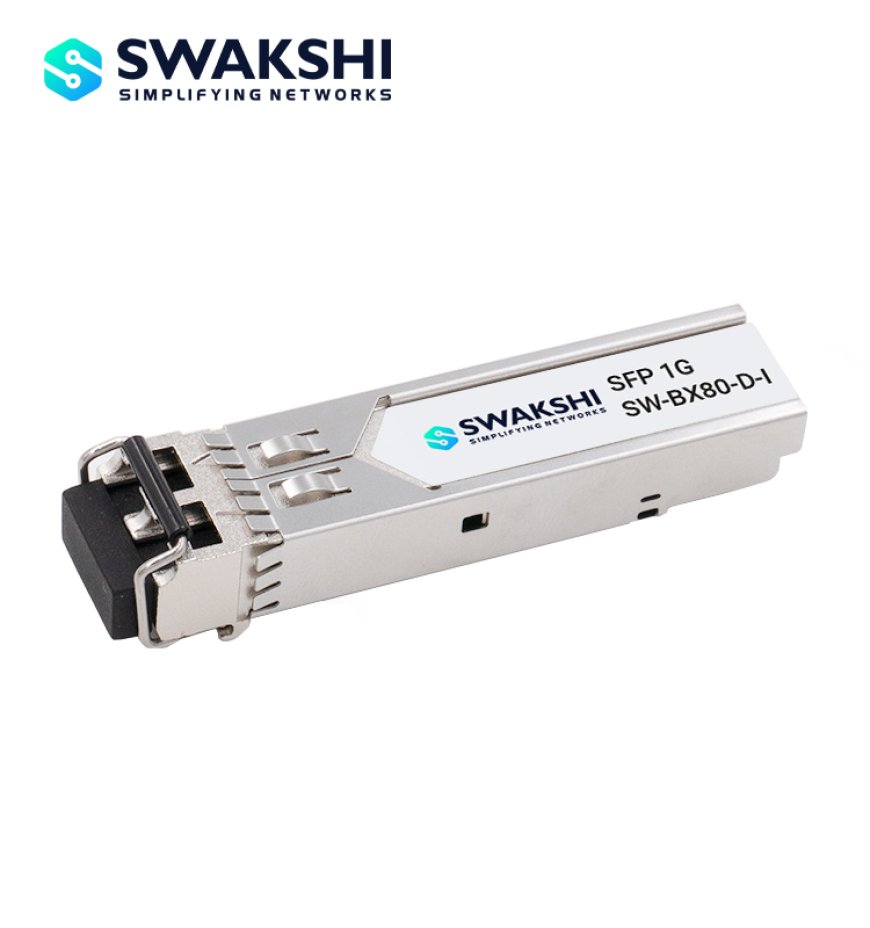SFP Vendor Secrets: Boost Your Network Efficiency
Discover Swakshi.co.in – your go-to source for reliable networking and industrial automation products, designed to deliver high performance and seamless connectivity.

In the world of enterprise networking, where uptime, speed, and scalability are non-negotiable, the humble SFP (Small Form-factor Pluggable) module plays a vital role. These transceivers may be small in size, but they’re essential for ensuring seamless data transmission over fiber or copper cables. For networking professionals managing high-demand environments, partnering with the right SFP Vendor can make the difference between an optimized network and one riddled with inefficiencies. In this article, we’ll uncover the secrets top SFP vendors use to help you boost network performance, save costs, and future-proof your infrastructure.
What Is an SFP Vendor?
An SFP Vendor is a company or supplier that provides SFP transceivers and related optical modules for networking equipment. These vendors may be original equipment manufacturers (OEMs), third-party providers, or resellers. Their offerings typically include a range of SFP types—such as SFP, SFP+, QSFP+, and more—supporting different speeds and distances.
The key distinction lies in the level of service and quality control they provide. While OEMs offer branded modules, third-party vendors often deliver compatible alternatives at more competitive prices. A trusted SFP vendor does more than just sell modules—they ensure those modules integrate perfectly with your hardware and meet the demands of your network.
How SFP Vendors Impact Network Efficiency
Not all SFP Module are created equal, and neither are the vendors supplying them. The right SFP vendor can help you improve your network in multiple ways. High-quality modules ensure compatibility with switches and routers, which means less downtime and fewer configuration issues. These modules also provide better thermal stability and power efficiency, which is essential in high-density data centers.
Top vendors test their transceivers rigorously to ensure compliance with industry standards. They also offer technical advice to help you choose the right product for your application, whether it's for short-range data center connections or long-haul fiber deployments. When your network is built on reliable transceivers, you experience fewer interruptions, improved speeds, and consistent performance under load.
Key Traits of a Reliable SFP Vendor
Choosing the right vendor means looking beyond price tags. A reliable SFP Vendor will offer modules that are MSA-compliant, meaning they conform to the Multi-Source Agreement that ensures compatibility across multiple platforms. They also provide clear documentation about which switches, routers, and brands their modules are compatible with.
A dependable vendor maintains a wide inventory, allowing for quick turnarounds even on large orders. They back their products with warranty coverage, offer responsive technical support, and have transparent return policies. Some vendors even provide customized programming services, allowing SFPs to be tailored to your specific hardware requirements.
Common Mistakes When Choosing an SFP Vendor
A common mistake among networking professionals is assuming that all SFPs are the same. In reality, using low-cost or non-certified modules can lead to serious problems—frequent link failures, system reboots, or even damaged ports. Over-prioritizing cost at the expense of reliability often results in expensive troubleshooting later.
Another pitfall is overlooking compatibility. Some switches reject third-party modules unless they're programmed to emulate the OEM versions. Without proper testing or technical consultation, you're left with gear that won't function as expected. Failing to assess vendor support is another oversight. When something goes wrong, you need a vendor who can help troubleshoot, replace faulty components quickly, and guide you through updates.
Insider Secrets to Boost Network Efficiency with the Right Vendor
A good SFP Vendor does more than provide parts—they actively contribute to your network's performance. For example, vendors that offer pre-programmed or customized modules save you the hassle of manual configurations. Some even provide tools for tracking the lifecycle of SFPs, helping with predictive maintenance and upgrades.
Establishing a long-term relationship with a vendor can lead to benefits like volume discounts, service-level agreements, and faster support responses. Some vendors also monitor changes in network standards and proactively recommend upgrades. By tapping into their expertise, you can make informed decisions that optimize network speed, minimize energy use, and enhance reliability.
Comparing OEM vs. Third-Party SFP Vendors
OEM vendors typically provide branded SFPs that guarantee compatibility but come at a premium cost. Third-party vendors, on the other hand, offer more budget-friendly alternatives without sacrificing performance—if chosen wisely. Reputable third-party vendors thoroughly test their products and often support a broader range of hardware than OEMs do.
In many real-world deployments, businesses have successfully used third-party modules to cut costs while maintaining high performance. With today’s pressure to stretch IT budgets, exploring qualified third-party SFP Vendor is a smart move. Just ensure they provide strong technical backing and certifications for their products.
Questions to Ask Before Partnering with an SFP Vendor
Before selecting a vendor, it’s crucial to ask the right questions. Start with technical ones: Are the modules MSA-compliant? Are they tested across major switch brands like Cisco, Juniper, HP, and MikroTik? Do they offer programming to ensure seamless integration?
Ask about their logistics and policies: How fast can they ship orders? What are the terms for returns or replacements? Can they supply consistent stock over long-term projects? A transparent, responsive vendor is essential for any network operation.
Future-Proofing Your Network with the Right SFP Vendor
Networking technologies evolve rapidly. With 100G, 200G, and even 400G transceivers becoming more common, you need a vendor who stays ahead of the curve. The right partner will not only supply current-generation modules but also guide you toward future-ready solutions.
Vendors investing in cutting-edge products—like BiDi, CWDM, and DWDM optics—can help your network scale more efficiently. They can also assist with planning upgrades that align with your growth projections. This proactive approach ensures your infrastructure won’t become obsolete just a few years down the line.
Conclusion
Your network is only as strong as its weakest link—and often, that link is the SFP module. Choosing the right SFP Vendor is not just a purchasing decision; it’s a strategic move that affects uptime, speed, compatibility, and scalability. Reliable vendors offer more than just products—they offer insights, support, and a partnership that helps you boost network efficiency now and into the future. Whether you’re upgrading a data center or expanding enterprise infrastructure, now is the time to evaluate your current SFP vendor and explore better-performing alternatives.















































































































































